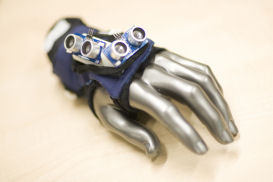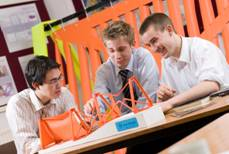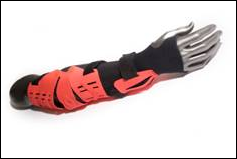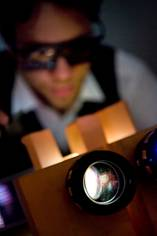Manufacturing Engineering students held their 2006 Design Show, displaying a range of new products that they have developed as part of their course.
The students have been working on their projects for most of the past year and the results are fantastic.
Dr James Moultrie




The Design Show is held each year for an invited audience of local industrialists and designers. Students put together displays to explain the technical and business ideas behind the products, together with design details and prototype models of the products themselves.
This year's projects included an innovative mobile accident screen to discourage 'rubbernecking' by passing motorists and a glove that uses ultrasound to help the partially sighted 'sense' their surroundings.
"The students have been working on their projects for most of the past year and the results are fantastic," said Lecturer Dr James Moultrie. "Some ideas have real commercial potential and they will be seeking finance to take them further."
"These projects demonstrate how important it is for engineers to develop their design skills," said Dr Moultrie. "It's not just about mastering the technology and science - engineers also need to think about their products from a user's perspective and design things that are both attractive and easy to use - and that fill a real need. Good design, in its widest sense, plays a vital part in turning technology into exciting and successful products."
The projects
Ten teams of four students each spent many months researching the market, designing and testing their product and preparing a business plan. Four of the projects this year were:
Touchsight: helping the visually impaired 'sense' their surroundings
"Our team set out with the aim of providing the visually impaired with confidence in the real world. Along the way we came to understand the difficulties faced by visually impaired people during their daily lives," said Samaan Rahman, one of the four members of the Touchsight team.
Products with electronic sensing systems for the blind do exist but very few have achieved widespread popular appeal and most are instantly noticeable and potentially stigmatise the user. The students came up with a revolutionary glove-based system, which combines ultra-sound with sensory feedback. The product is unobtrusive and enables the user to 'sense' their immediate surroundings. Trials with blind users have resulted in extremely positive feedback and a demand for the product to be taken all the way to market. "Analysis carried out by the team has shown the product to be technically feasible as well as financially viable," said Samaan. "Furthermore, from the invaluable feedback given by user groups, we are confident that we have a product with the potential to improve the quality of life for many people."
Axi-Shield: the accident screen that puts a stop to rubbernecking
Axi-Shield is a versatile mobile accident screen capable of fast and safe deployment on major roads, to reduce the likelihood of secondary accidents caused by 'rubbernecking'. The students behind it say it could be deployed from a standard transit van in under five minutes to provide rapid protection around an accident scene. Rubbernecking costs an estimated £27m annually in the UK, through time lost and through further accidents resulting in secondary fatalities. The UK Highways Agency has been trialling a system developed in the Netherlands. Early evidence indicates a cheaper more flexible solution is needed which can be rapidly deployed. Axi-Shield addresses this gap and the student team believes it represents the most advanced mobile anti-traffic screen in the world.
Snowshell: intelligent snowboard protection
The Snowshell arm guard has been designed from first principles, based around a thorough understanding of how the arm behaves during a fall. There are an estimated 450,000 serious injuries globally as a result of snowboarding accidents. Over 45% of these are injuries to the arms. Although there are a large number of wrist and arm guards on the market, users complain that they are unappealing, uncomfortable and do not provide real protection in a major fall. The Snowshell arm guard aims to address all of these concerns, providing a carefully engineered solution that prevents the arm 'locking-out' during a fall, as well as providing wrist support and impact protection.
MyMax: 3D movies from a standard projector
There are a growing number of movies being produced in 3D formats, but which can only be watched using expensive and high-tech equipment. The MyMax system is an optical device which, when added to the front of a standard projector, enables these films to be viewed in all their 3D glory. This simple solution makes 3D cinema in the home a reality. "Developing MyMAX was a technical and business challenge, particularly as we were all too aware that the market for such a product is time-limited," said team member Sarah Edmund. "Overall we are very happy with the outcome, both in the way we managed to work as a team and to get MyMAX itself to work!"
Manufacturing Engineering is an option for undergraduates in their third and fourth years of a four-year engineering degree. It is taught in the Institute for Manufacturing, a part of the Department of Engineering.
Design forms an important part of the course, with a team-based project that runs throughout the student's third year. Students apply design and engineering skills to develop solutions to real problems. The teams create working technologies accompanied by a detailed business plan, addressing how their products will be taken to market.
Cambridge manufacturing students are much sought-after for demanding jobs, not only in manufacturing industry but also in other branches of engineering, consultancy or commerce and a whole range of unrelated fields. Students are well placed to start their own companies and many have gone on to do so.

